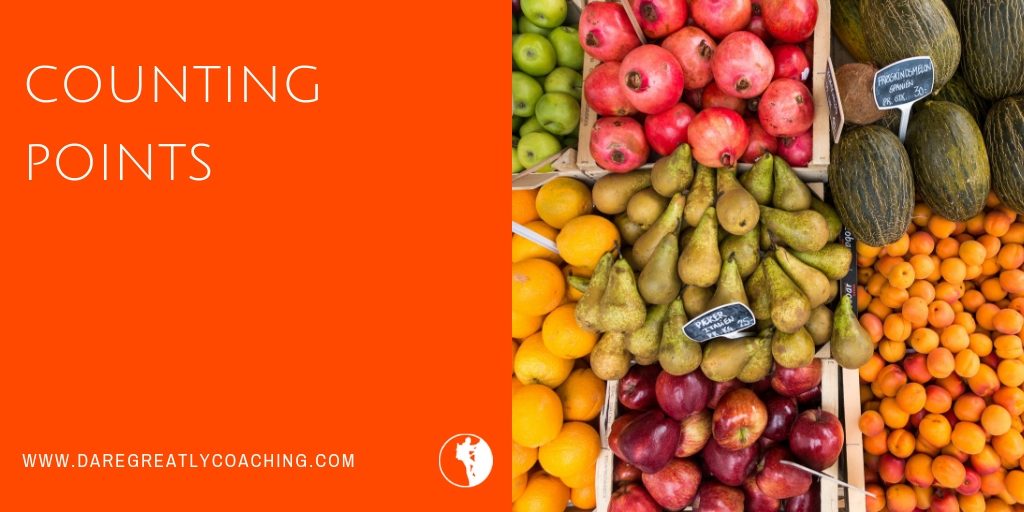What you can learn from Weight Watchers’ points counting about reducing stress

About 16 years ago I was heavier than I had ever been: around 105 kg or about 231 lbs. Over the course of a couple of years I had slowly been gaining weight, but as I looked in the mirror one morning I decided it was enough!
Enough of buying clothes in ever bigger sizes. Enough of the physical discomfort that comes with being overweight. Enough of being disgusted with the way I looked. That same evening I visited a Weightwatchers’ (WW) meeting and signed up for their program.
I’m not sure how WW works these days, but back then the first thing they did was make you aware of what your food intake was.
When I got home that day I settled into a routine of writing down every bit of food that passed my lips. Every sip of beverage I took.
I started counting points. In the WW system, every food and beverage has a point value that corresponds to its amount of energy. Depending on things like age, height, body weight, goal weight and BMI your maximum point intake per day is calculated.
As I got more insight in what I was eating and drinking, for the first time I had no choice but to face how many unhealthy choices I was making. I was stunned to find that most days I took in at least double when not triple the number of points I was supposed to limit myself to.
It’s not that I didn’t know I was making unhealthy choices some of the time, but rather that I hadn’t realised that some of the time had turned into all of the time.
Seeing my eating habits spelled out before me, made it easy for me to see where I could make healthier choices. It didn’t take me long to bring my energy intake back down and with it the numbers on my scale.
And though I kept counting points for a long time after I hit my desired weight, the more important thing I learned in my time with WW was a healthier lifestyle. Taking out (most of) the foods and beverages that were detrimental to my health and substituting them with healthier choices.
Would I have been able to make these lifestyle changes all by myself? No! I had tried and failed many times before. I needed a system that would give me insight in what was one of the causes of my being overweight. I also needed the support and accountability that the WW program gave me.
(CAVEAT: WW only looks at your eating habits and doesn’t take into account any reasons there might be that can cause over-eating, like emotional stress or physical issues. In my case, emotional stress caused me to over-eat. That too was something I had to confront, but that is a story for another time)
Reducing stress by counting points?
Not exactly, but you can start reducing stress by taking a leaf out of the WW handbook.
When you’re in the middle of over-stress it can be hard if not impossible to have a clear idea of all the things that are causing you stress. Just like I had no clear idea of what was causing me to be overweight.
Having insight in what is causing you stress is the first step toward being able to make ‘healthy choices’. The first step towards taking out of your life things, activities, and people that cause you unhealthy stress levels.
The easiest way to get insight is by writing down for at least a week everything – no matter how big or small – that causes you stress. And I do mean everything. From your kid that didn’t replace the empty toilet-roll to the boss that screamed his head off in the staff meeting this morning. Everything!
After that week sit down with your list and analyse it. Are there things on it that you can easily cross off? Things that belong on some other person’s plate? Things that don’t have to be done at all? Things for which there are easy solutions and then never have to be tackled again? Things you said “Yes” to, when you meant to say “No”?
Be critical and cross off everything that isn’t yours, to begin with. Then move on to the things you said “Yes” to when you should have said “No”. And so on.
Remember to replace some of the things you take off your list (your ‘unhealthy choices’) with things that are fun and energising (’healthy choices’). Until your lists represent things and activities that are actually yours and amount to what you consider to be reasonable and balanced.
You may have to talk to some people to explain that in future you will do things differently and how that may affect them.
And you may have to organise accountability and support to steady you as you set a new course for yourself.
Reducing stress starts by gaining insight into what causes you stress. Only through being aware of your ‘unhealthy choices’ can you start making ’healthier’ ones.
What is one unhealthy choice you are making right now, that you can easily replace with a healthier one?
As always….
Go dare greatly
Gerdi
 Previous Post
Previous Post Next Post
Next Post

